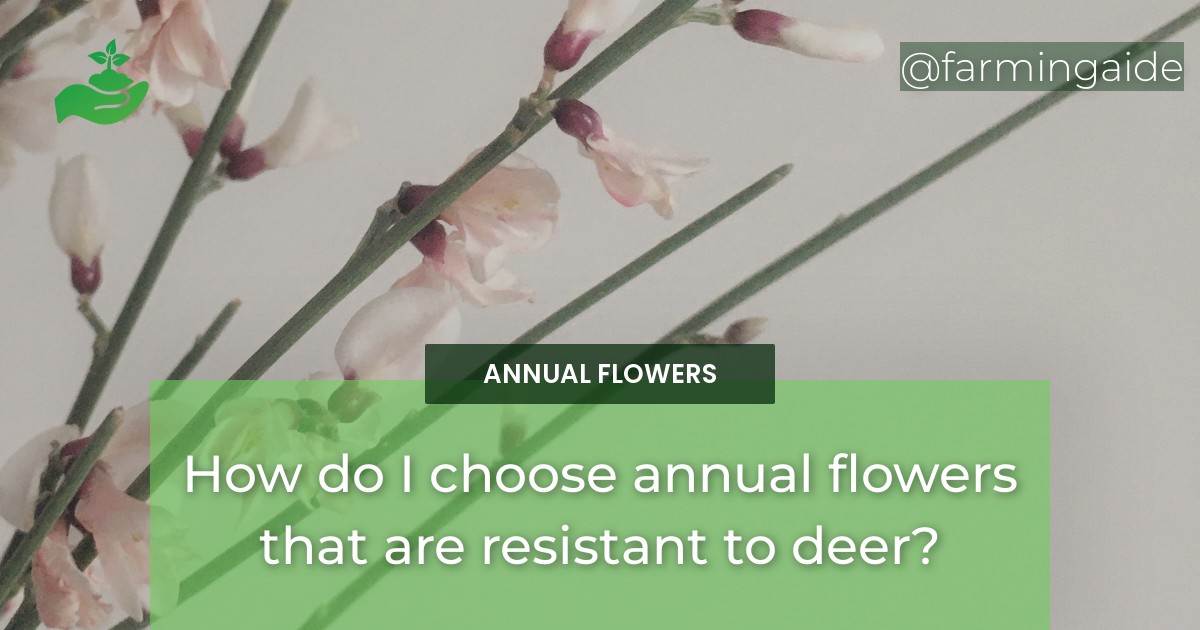Choosing annual flowers that are resistant to deer can be a daunting task, especially if you live in an area with a high deer population. Deer are known to be fond of munching on many beautiful annual flowers like petunias, impatiens, and marigolds, leaving your garden looking ravaged. However, there are many deer-resistant annual flowers that you can choose to plant in your garden to deter deer from feasting on your flowers.
Understanding Deer-Resistant Annual Flowers
Characteristics of Deer-Resistant Annual Flowers
Deer-resistant annual flowers are plants that deer do not usually find palatable. These flowers have certain characteristics that make them less attractive to deer, such as having a strong scent or taste, being prickly, or having tough foliage.
Some common deer-resistant annual flowers include:
- Salvia
- Zinnia
- Cosmos
- Ageratum
- Lantana
- Nicotiana
Factors Affecting Deer Resistance in Annual Flowers
Several factors can affect the resistance of annual flowers to deer. These factors include the smell and taste of the flower, their texture, and the availability of other foods for the deer. Flowers with strong scents and tastes are less attractive to deer, and those with rough or fuzzy textures are more difficult for deer to eat.
Benefits of Growing Deer-Resistant Annual Flowers
Choosing to plant deer-resistant annual flowers in your garden has many benefits, including:
- Less damage to your garden from deer feeding on your plants
- Less money spent on deer repellents and fencing
- A wider variety of flowers to choose from, as you do not have to limit yourself to just deer-resistant varieties
Tips for Choosing Deer-Resistant Annual Flowers
Researching Deer-Resistant Annual Flowers
When researching deer-resistant annual flowers, it is important to look for varieties that are known to be less attractive to deer. Some good resources for finding deer-resistant annual flowers include:
- Local gardening centers and nurseries
- Online gardening forums and websites
- Catalogs from seed companies
Selecting Deer-Resistant Annual Flowers Based on Characteristics
When selecting deer-resistant annual flowers, it is important to choose flowers with characteristics that make them less attractive to deer. Some characteristics to look for include:
- Strong smells and tastes
- Prickly or thorny foliage
- Tough textures or fuzzy leaves
- Plants with high toxicity levels
Considering Site-Specific Factors
The location of your garden can also affect the likelihood of deer visits. If you live in an area with a high deer population, it may be necessary to choose annual flowers that are more resistant to deer. Additionally, the location of your garden in relation to other food sources for deer, such as fruit trees or vegetable gardens, can also affect deer visits.
Using Companion Planting Techniques
Companion planting is a technique that involves planting two or more plants together, where one plant benefits the other. Some plants have strong scents that can repel deer when planted alongside flowers that are more attractive to deer. Some good companion plants for deer-resistant annual flowers include:
- Lavender
- Mint
- Garlic
- Oregano
Tips for Deterring Deer from Damaging Garden Plants
Using Physical Barriers
One effective way to deter deer from feeding on your garden plants is to use physical barriers. Fencing can be an effective way to keep deer out of your garden, but it can be expensive. Other physical barriers include netting and cages placed around individual plants.
Using Repellents
Several types of deer repellents are available on the market, including sprays, granules, and electronic devices that emit high-frequency sounds that deer find unpleasant. When using repellents, it is important to follow the manufacturer’s instructions carefully.
Using Scare Tactics
Another way to deter deer from feeding on your garden plants is to use scare tactics. Some effective scare tactics include the use of motion-activated sprinklers, scarecrows, and shiny objects like CDs or aluminum foil.
Modifying Garden Design and Planting Techniques
Modifying your garden design and planting techniques can also help deter deer from feeding on your plants. Some effective techniques include:
- Planting deer-resistant annual flowers in raised beds or containers
- Planting flowers in areas that are difficult for deer to reach, such as on slopes or in narrow spaces
- Planting deer-resistant annuals with other unpalatable plants to create a barrier around more attractive plants
What Are the Best Methods for Choosing Deer-Resistant Annual Flowers for My Garden?
When choosing deer-resistant annual flowers for your garden, it’s essential to consider plants such as marigolds, snapdragons, and salvia. These varieties are known for their ability to repel deer and thrive during the growing season. With proper research and planning, you can enjoy a beautiful garden full of deerresistant annual flowers.
Conclusion
Choosing annual flowers that are resistant to deer is an important step in maintaining a beautiful and healthy garden. By researching deer-resistant annual flowers, selecting flowers based on their characteristics, considering site-specific factors, and using companion planting techniques, you can create a beautiful garden that is less attractive to deer. Additionally, using physical barriers, repellents, scare tactics, and modifying garden design and planting techniques can help deter deer from feeding on your garden plants.


